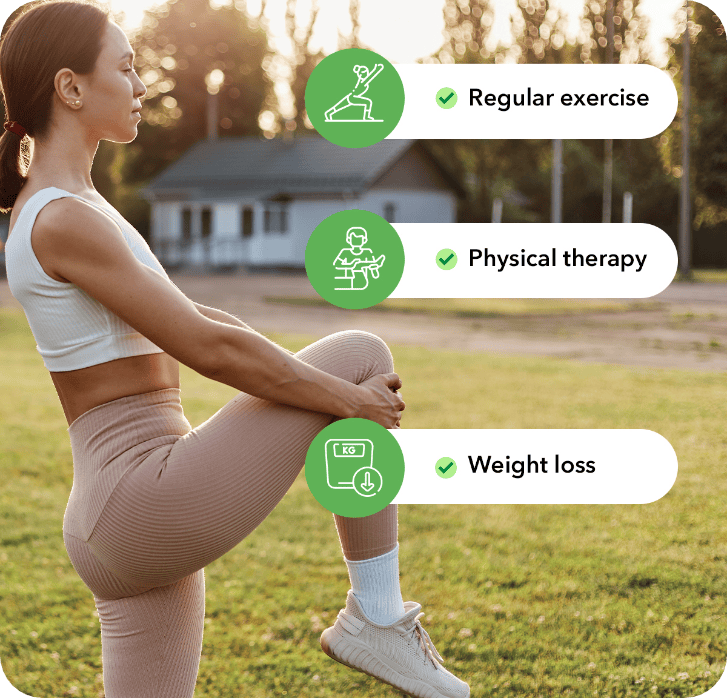Who doesn’t like to wake up feeling refreshed, relaxed, and ready for a brand-new day? But lower back pain in the morning can be a rude awakening for you. Let’s get to the bottom of what causes morning back pain and what you can do to feel better.
Ouch, My Aching Back!
Four out of five people will have back pain at some point in their lives. In fact, according to the Cleveland Clinic, it’s one of the most common reasons to seek help from your healthcare provider. Lower back pain in the morning can have several possible causes. It may simply be that you slept in a weird position, have a bad mattress, or need new pillows, or it may be a chronic issue that needs medical attention.
Here are a few common reasons why people may experience lower back pain upon waking up:
While sleeping, the body tends to relax and remain in one position for an extended period. This lack of movement can lead to stiffness and muscle imbalances, which may result in lower back pain upon waking.
Prolonged periods of inactivity or a sedentary lifestyle can lead to weakened and tight muscles. Imbalances in the muscles supporting the spine, such as weak abdominal muscles and tight hip flexors, can place additional stress on the lower back, causing muscle strains, spasms, and sprains.
You may have overdone it with activities or exercise the day before, making your lower back stiff and sore the next morning.
The discs in the spine act as shock absorbers between the vertebrae. As we age, the discs can degenerate or herniate, leading to conditions such as degenerative disc disease or a herniated disc.
Certain inflammatory conditions, like arthritis, can cause morning stiffness and lower back pain. These conditions are often characterized by increased pain and stiffness after periods of inactivity, including sleep.
Psychological and emotional stress can manifest physically in the body, leading to muscle tension and discomfort, including in the lower back.
If That Doesn’t Work…
If you are dealing with a more chronic lower back condition like degenerative disc disease, the pain is coming from compression of the nerves in the spine. Your morning pain and stiffness may get worse when sitting, lifting, or bending but may improve with movement, according to the Cleveland Clinic.
Other more serious conditions that may not improve with home remedies include arthritis inflammation; spinal stenosis, which happens when the spinal column is too narrow for the spinal cord; scoliosis, also known as curvature of the spine; or sciatica, with pain that radiates from the lower back down the back of the legs.
It is always recommended to seek the guidance of your provider when you’re experiencing prolonged pain. You may be advised to take nonsteroidal anti-inflammatory drugs (NSAIDs) or prescription drugs to relieve pain and relax muscles. Your healthcare provider may recommend physical therapy to strengthen muscles and provide more flexibility. To reduce inflammation and pain, steroid Injections might be suggested, and in some cases, surgery may be recommended.

How Do I Stop Waking Up With Lower Back Pain?
If your back pain is acute, lasting for a short time, there may be some simple things you can do. These self-care tips could get you waking up pain-free and get your morning started off right.
- Invest in a firm mattress and pillow. A mattress that properly supports your spine and promotes good alignment can make a significant difference in reducing back pain.
- Pay attention to your sleeping position. Sleeping on your back with a pillow under your knees can help maintain the natural curvature of your spine. If you’re a side sleeper, place a pillow between your knees to align your hips and reduce strain on your lower back. Avoid sleeping on your stomach, as it can strain your neck and lower back.
- Gentle stretching exercises before bed and in the morning can help relieve muscle tension and increase flexibility. Focus on stretches that target the lower back, hips, and hamstrings. It’s always best to consult a physical therapist for specific exercises that suit your needs.
- Engage in regular physical activity and exercises that promote core strength and flexibility. Strong core muscles provide support to the lower back and can help prevent pain. Low-impact activities like walking, swimming, or yoga can be beneficial.
- Applying heat or cold to the affected area can help reduce inflammation and alleviate pain. Experiment with heat packs, cold packs, or hot showers to find which option works best for you.
- Find ways to manage stress, such as practicing relaxation techniques, deep breathing exercises, meditation, or engaging in activities you enjoy.
- Excess weight can put additional stress on your back and contribute to pain. Strive to maintain a healthy weight through a balanced diet and regular exercise.
Restore Quality of Life with QC Kinetix
At QC Kinetix, we utilize regenerative medicine as a lower back pain treatment. Our clinical therapies use the body’s natural ability to heal and repair with the goal of helping you return to your daily activities, avoiding surgery and pain meds.
If you’re ready to wake up and start living a better quality of life, schedule a free consultation, and we’ll take time with you to discuss the benefits of regenerative therapies.

